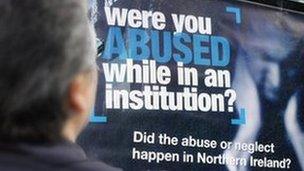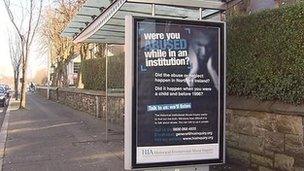Abuse inquiry criticised over level of victim support
- Published

The inquiry is examining claims of physical, sexual and emotional abuse, and neglect, in state-run children's homes
A campaign group has criticised the level of counselling provided to victims who are giving evidence to a Northern Ireland child abuse inquiry.
SAVIA said some witnesses have been suicidal after giving testimony to the Historical Institutional Abuse Inquiry.
SAVIA's secretary, Allison Diver, said victims' group like hers were being left to "pick up the pieces".
The inquiry has its own witness support service, but Ms Diver said it was not doing enough to help witnesses.
The Historical Institutional Abuse Inquiry was set up by the Stormont executive to examine allegations of abuse in state-run children's homes and other institutions in Northern Ireland from 1922 to 1995.
It is being chaired by retired judge Sir Anthony Hart and has already interviewed more than 150 witnesses, many of whom suffered physical, sexual, emotional abuse, and neglect, as children in residential homes.
Face-to-face
However, Ms Diver's group, Survivors and Victims of Institutional Abuse, has said they are taking calls from people who have tried to take their own lives shortly after giving evidence to the inquiry, having relived the trauma of their abuse.
"When you come out, you're left on the street and there's nobody to catch you," Ms Diver told BBC Radio Ulster.
"Some people have ended up on the brink of suicide. We have had to go to bridges, where people were going to throw themselves off."
SAVIA has called for face-to-face counselling, by trained professionals, to be provided to witnesses before and after they go through the interview process.
The group wrote to the Office of the First and Deputy First Minister (OFMDFM) in June, outlining their concerns, but said they have yet to receive a reply.
"We would have expected, with such a pressing matter, that someone would have come back to us straight away," Ms Diver said.
Stormont tendered for a counselling service last year, and it was expected to be in place by March this year, but SAVIA said so far it has not materialised.

Posters calling for victims to come forward to give evidence have appeared on bus shelters
Ms Diver said that, at present, witnesses are still going through the inquiry process and SAVIA is "trying to pick up the pieces in the meantime, and trying to be there for people".
"But I mean, we're not trained councillors, and they do need fully trained councillors," she said.
"We were told that we were going to get a tailored package, that would be what victims need - and we were asked in the process what they needed, what we felt they needed - and we're still just being (referred) back to Lifeline or Nexus.
"People don't want to be going through the same trauma of reliving it and trying to explain to the next person on the phone what it is that's happened to them."
'Human contact'
She said a dedicated witness support officer was provided on the day that victims give evidence, but having gone through the interview process herself, Ms Diver questioned the level of support.
"I met with a lovely lady, she gave me a cup of tea and stuff and they take you straight through then to the panel, but I didn't realise that (she) was a support officer."
Having worked in the area of victim support, Ms Diver said that if she did not know that the woman was providing the victim support on offer, then others less familiar with the process probably would not realise either.
Ms Diver said: "Before anyone else goes through the doors of the inquiry, sufficient counselling should be in place to let them know what's going to happen to them."
"When they come out, someone should be standing waiting on them, it's the human contact.
"If you've just gone through and spilled out your guts, and gone through the whole thing in your head, the last thing you want to do is pick up a phone, when you're having an emotional breakdown, and trying to speak to someone on a phone, because there's no contact, there's no human hand there."
'Emotional support'
BBC Northern Ireland put the issues raised by SAVIA to a representative of the Historical Institutional Abuse Inquiry.
They referred to an earlier statement on their website that said: "The inquiry is well aware that, for many victims and survivors, the process of recounting relevant events can be traumatic for some of the individuals involved.
"Every effort has been made to ensure that sufficient emotional support is available for victims and survivors while they recount their experiences to the acknowledgement forum or give evidence to the inquiry.
"The inquiry has its own witness support service with dedicated witness support officers who provide this role," the statement said.
A spokesperson for OFMDFM told the BBC that the department will "establish a wider victims support service to provide support and advice to victims and survivors before, during and after the inquiry".
- Published21 February 2013
- Published29 May 2013
- Published19 October 2012